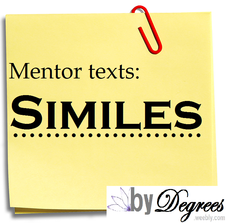An example of figurative language, similes are a way to compare two unlike things, using like or as.
"He just stood there, and Winn-Dixie came barreling right toward him like he was a bowling ball and the preacher was the only pin left standing, and wham, they both fell to the ground (Kate DiCamillo, Because of Winn-Dixie, 74).
“…and he’s dead. Dead as a squashed June bug…” (Ellen Raskin, The Westing Game, 14).
“I was more isolated than a shipwrecked sailor on a raft in the middle of the ocean” (Antoine de Saint-Exupery, The Little Prince, 6).
“Reading provides you with words, like the colors of God’s rainbow, to paint your ideas, to give beauty and variety to your thought” (Avi, Murder at Midnight, 32).
“Dressed entirely in black, Count Scarazoni had a thin, pinched face with dark eyebrows that swept over his angry eyes like a bar of iron” (Avi, Murder at Midnight, 70).
“His house is as void of the religion of Christ as the white of an egg is of flavor” (John Bunyan, Pilgrim’s Progress, 79).
“Like a chameleon, he changes his color every time he changes his environment” (John Bunyan, Pilgrim’s Progress, 79).
“The name comes out flat, bitter as a bad pecan” (Kathryn Stockett, The Help, 122).
“Alton was a long, skinny, baby with hair fine as silk corn…” (Kathryn Stockett, The Help, 149).
"His whiskers became as tight as bowstrings" (Kate DiCamillo, The Tale of Despereaux, 32).
For variety, sentences can begin with prepositional phrases. Find a list of prepositions here. Notice the comma after the phrase. "On her first day, Chrysanthemum wore her sunniest dress and her brightest smile" (Kevin Henkes, Chrysanthemum).
"For one second, before the metal cooled, the inside of his right hand, from wrist to fingertips, was coated with solid silver" (Esther Forbes, Johnny Tremain, 33).
"In the hard-packed dirt of the driveway, after the glaring lights are out and the peOple have gone home to bed, you will find a veritable treasure of popcorn fragments, frozen custard dribbling, candied apples abandoned by tired children, sugar fluff crystals, salted almonds, popsicles, partially gnawed ice cream cones, and the wooden sticks of lollypops" (E. B. White, Charlotte's Web, 123).
Harry Noden explains an appositive as "a noun that adds a second image to a preceding noun" (Image Grammar 8).
Notes about Appositives:
- Appositives interrupt a sentence.
- They are set apart with punctuation, generally commas.
"Nana-Fall-River, his Italian grandmother, put one in a special frame on the table next to the photographer of Aunt Clo in her wedding dress" (Tomie dePaola, The Art Lesson).
"Tom and Nana, Tommy's Irish grandfather and grandmother, had his pictures in their grocery story" (Tomie dePaola, The Art Lesson).
Catherine the Great, my Russian grandma, is already awake. (Cari Best, Three Cheers for Catherine the Great)
Avon, a rather small snail, read a book every day. (Avi, The End of the Beginning)
Keith, the boy in rumpled shorts and shirt, did not know he was being watched as he entered room 215 of the Mountain View Inn. (Beverly Cleary, The Mouse and the Motorcycle)
My time with Albert Einstein, my grandfather, passed all too quickly. (Marfe Ferguson, Delano, Genius: A Photobiography of Albert Einstein)
"Reader, you must know that an interesting fate (sometimes involving rats, sometimes not) awaits almost everyone, mouse or man, who does not conform" (Kate DiCamillo, The Tale of Despereaux, 25).
"The sound was King Phillip playing his guitar and singing to his daughter, the Princess Pea, every night before she fell asleep" (Kate DiCamillo, The Tale of Despereaux, 27).
At www.chompchomp.com, you will find this description of participial (or participle) phrases: "Participle phrases always function as adjectives, adding description to the sentence." These phrases can add depth and maturity to students' writing, helping them to avoid choppy prose.
Notes about Participial Phrases:
- Participial phrases can be found anywhere in the sentence: beginning, middle, or end.
- It's very easy to misplace these modifiers, especially when they begin a sentence. I once heard Andrew Pudewa say at a workshop, "The thing after the ing needs to be the thing doing the inging." For example, in the first sentence below, he comes immediately after frowning. He is the one frowning. This is correct. In the second sentence, they is the first word after the participial phrase. Since they are the ones turning the corner, this is also correct.
- Participial phrases are typically accompanied by a comma if they appear in the beginning or end of the sentence. If they are in the middle, they are surrounded by commas.
- Present tense participles end in -ing, past tense in -ed. There are many irregular ones as well.
- Participial phrases can be strung one after another.
At the beginning:
"Frowning, he finally came out with a single marble" (Jeff Brumbeau, The Quiltmaker's Gift).
"Turning a corner suddenly, they came upon two vans, a tent, and a company of gypsies encamped by the side of the road" (E. Nesbit, Five Children and It, 70).
"Pushing the covers back, Stuart climbed out of bed" (E. B. White, Stuart Little, 54).
"Taking his bow and arrow and his flashlight, he tiptoed out into the hall" (E. B. White, Stuart Little, 54).
Being careful not to make a sound, he stole across to the lamp by the bookshelf, shinnied up the cord, and climbed out onto the shelf" (E. B. White, Stuart Little, 54).
In the middle:
"While he was there, waiting for the dog to go away, a garbage truck from the Department of Sanitation drove up to the curb and two men picked up the can" (E. B. White, Stuart Little, 58).
"And then, tracing each word with his paw, he read the story of a beautiful princess and the brave knight who serves and honors her" (Kate DiCamillo, The Tale of Despereaux, 24).
At the end:
"Many people climbed her mountain, pockets bursting with gold, hoping to buy one of the wonderful quilts" (Jeff Brumbeau, The Quiltmaker's Gift).
"Paralyzed, my face on fire, I could only look at her, shocked at what I had done (Katherine Hannigan, Ida B, 212).
"She was standing there, sucking on the knuckle of her third finger, staring in the window of Gertrude's Pets" (Kate DiCamillo, Because of Winn Dixie, 57).
"'Once upon a time,' he said aloud, relishing the sound" (Kate DiCamillo, The Tale of Despereaux, 24).
"'Move side to side,' instructed Furlough, scrabbling across the waxed castle floor" (Kate DiCamillo, The Tale of Despereaux, 20).
Jeff Anderson helps students remember adverb clauses by teaching them the "AAAWWUBBIS whoop" (Mechanically Inclined 38). These words--after, although, as, while, when, until, before, because, if, since--introduce adverb clauses.
Notes about adverb clauses:
- They can occur anywhere in the sentence: beginning, middle, or end.
- Where there is an adverb clause, there is a comma nearby.
- They depend on complete sentences. If you write an adverb clause without one, you will end up with a fragment.
The If You Give... books by Laura Numeroff would work well to teach AAAWWUBBIS clauses.
Some of the titles in the series: If You Give a Mouse a Cookie, If You Give a Pig a Pancake, If You Give a Dog a Donut, If You take a Mouse to the Movies
"When the members of this clever crew are not on duty, I find them singing and dancing or amusing each other with tales of past adventure" (Chris Van Allsburg, The Wretched Stone).
"Because he was so small, Stuart was often hard to find around the house" (E. B. White, Stuart Little, 47).
"After everything had been checked and the money had been paid, Stuart climbed in, started the engine, and drove out onto the highway" (E. B. White, Stuart Little, 126).
"The Lamb, as Martha had said, was feeling the benefit of the country air, and he was as frisky as a sandhopper" (E. Nesbit, Five Children and It, 63). Notice the compound sentence as well!
"While Antoinette touched up her eye makeup, the mouse father put Despereaux down on a bed made of blanket scraps" ((Kate DiCamillo, The Tale of Despereaux, 12).
When you have a series of three or more words or phrases in a sentence, you need a comma before the last piece of the series (unless, of course, you're British; then you don't include a comma there).
"She would then take a newly finished quilt from her bag, wrap it around their quivering shoulders, tuck them in tight, and tiptoe away" (Jeff Brumbeau, The Quiltmaker's Gift).
"Avery put on clean underwear, clean blue jeans, and a clean shirt" (E. B. White, Charlotte's Web, 119).
The Tale of Despereaux being the story of a mouse, a princess, some soup, and a spool of thread (Kate DiCamillo)
"...Is it ridiculous for a very small, sickly, big-eared mouse to fall in love with a beautiful human princess named Pea?" (Kate DiCamillo, The Tale of Despereaux, 32).
Compound sentences are two complete sentences joined with one of the FANBOYS (for, and, nor, but, or, yet, so) and separated by a comma.
"Every day was a happy day, and every night was peaceful" (E. B. White, Charlotte's Web, 11).
"You'll have to forgive me, for I had no idea that in all the world there was such a small sailor" (E. B. White, Stuart Little, 29).
"But the truth was the drain had made him very slimy, and it was necessary for him to take a bath and sprinkle himself with a bit of his mother's violet water before he felt himself again" (E. B. White, Stuart Little, 6).
"His hair was mussed up, but his face was beaming with a big smile" (R. C. Sproul, The King Without a Shadow).
"His mom and dad were having a new house built, so Tommy drew pictures of what it would look like when it was finished" (Tomie dePaola, The Art Lesson).
"My quilts are for the poor and needy, and I can easily see that you are neither" (Jeff, Brumbeau, The Quiltmaker's Gift).
Two-word sentences have all they need to qualify as complete sentences: a subject and a verb. Used appropriately, they can be powerful. When teaching students about complete sentences, the two-word sentence is a good starting point.
"Chrysanthemum could scarcely believe her ears. She blushed. She beamed. She bloomed" (Kevin Henkes, Chrysanthemum).
"Chrysanthemum wilted" (Kevin Henkes, Chrysanthemum).
"Jesus wept" (John 11: 35).
"He shivered. He sneezed" (Kate DiCamillo, The Tale of Despereaux, 24).
"He squinted" (Kate DiCamillo, The Tale of Despereaux, 28).
"He trembled. He shook. He sneezed" (Kate DiCamillo, The Tale of Despereaux, 28).
|



 RSS Feed
RSS Feed